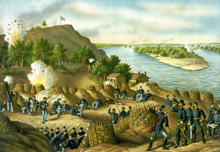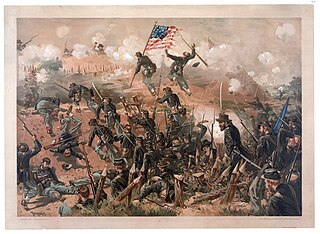| |||||
| Decades: | |||||
|---|---|---|---|---|---|
| See also: | |||||
Events from the year 1863 in the United States.
| |||||
| Decades: | |||||
|---|---|---|---|---|---|
| See also: | |||||
Events from the year 1863 in the United States.



"Four score and seven years ago our fathers brought forth on this continent, a new nation, conceived in Liberty, and dedicated to the proposition that all men are created equal. Now we are engaged in a great civil war, testing whether that nation or any nation so conceived and so dedicated, can long endure."
Contents
From President Abraham Lincoln's Gettysburg Address, November 19, 1863
1863 (MDCCCLXIII) was a common year starting on Thursday of the Gregorian calendar and a common year starting on Tuesday of the Julian calendar, the 1863rd year of the Common Era (CE) and Anno Domini (AD) designations, the 863rd year of the 2nd millennium, the 63rd year of the 19th century, and the 4th year of the 1860s decade. As of the start of 1863, the Gregorian calendar was 12 days ahead of the Julian calendar, which remained in localized use until 1923.

The siege of Vicksburg was the final major military action in the Vicksburg campaign of the American Civil War. In a series of maneuvers, Union Major General Ulysses S. Grant and his Army of the Tennessee crossed the Mississippi River and drove the Confederate Army of Mississippi, led by Lieutenant General John C. Pemberton, into the defensive lines surrounding the fortress city of Vicksburg, Mississippi, leading to the successful siege and Confederate surrender.

The Vicksburg campaign was a series of maneuvers and battles in the Western Theater of the American Civil War directed against Vicksburg, Mississippi, a fortress city that dominated the last Confederate-controlled section of the Mississippi River. The Union Army of the Tennessee under Major General Ulysses S. Grant gained control of the river by capturing this stronghold and defeating Lieutenant General John C. Pemberton's forces stationed there.

The Army of the Tennessee was a Union army in the Western Theater of the American Civil War, named for the Tennessee River.

The Army of the Cumberland was one of the principal Union armies in the Western Theater during the American Civil War. It was originally known as the Army of the Ohio.

There is widespread disagreement among historians about the turning point of the American Civil War. A turning point in this context is an event that occurred during the conflict after which most modern scholars would agree that the eventual outcome was inevitable. The near simultaneous Battle of Gettysburg and fall of Vicksburg in July 1863 is widely cited as the military climax of the American Civil War. Several other decisive battles and events throughout the war have been proposed as turning points. The events are presented here in chronological order with only the positive arguments for each given.

Grenville Mellen Dodge was a Union Army officer on the frontier and a pioneering figure in military intelligence during the Civil War, who served as Ulysses S. Grant's intelligence chief in the Western Theater. He served in several notable assignments, including command of the XVI Corps during the Atlanta Campaign.

The following engagements took place in the year 1863 during the American Civil War. During the year, Union forces captured the Confederate cities of Vicksburg and Port Hudson, giving them complete control over the Mississippi River, while forcing Confederates out of the North following the Battle of Gettysburg.

The western theater of the American Civil War encompassed major military operations in the states of Alabama, Georgia, Florida, Mississippi, North Carolina, Kentucky, South Carolina and Tennessee, as well as Louisiana east of the Mississippi River. Operations on the coasts of these states, except for Mobile Bay, are considered part of the Lower Seaboard Theater. Most other operations east of the Appalachian Mountains are part of the eastern theater. Operations west of the Mississippi River took place in the trans-Mississippi theater.
A political general is a general officer or other military leader without significant military experience who is given a high position in command for political reasons, through political connections, or to appease certain political blocs and factions.

Carter Littlepage Stevenson, Jr. was a career military officer, serving in the United States Army in several antebellum wars and then in the Confederate States Army as a general in the Western Theater of the American Civil War.

Grant Comes East: A Novel of the Civil War (2004) is an alternate history novel written by Newt Gingrich, William R. Forstchen, and Albert S. Hanser. It is the second of a trilogy, following Gettysburg: A Novel of the Civil War and preceding Never Call Retreat: Lee and Grant: The Final Victory. Published in 2005, the novel includes illustrations and historic photographs of the Civil War. It was featured on The New York Times bestseller list.

Mississippi was the second southern state to declare its secession from the United States, doing so on January 9, 1861. It joined with six other southern states to form the Confederacy on February 4, 1861. Mississippi's location along the lengthy Mississippi River made it strategically important to both the Union and the Confederacy; dozens of battles were fought in the state as armies repeatedly clashed near key towns and transportation nodes.
The Mississippi River campaigns, within the Trans-Mississippi Theater of the American Civil War, were a series of military actions by the Union Army during which Union troops, helped by Union Navy gunboats and river ironclads, took control of the Cumberland River, the Tennessee River, and the Mississippi River, a main north-south avenue of transport.

States Rights Gist was a lawyer, a militia general in South Carolina, and a Confederate Army brigadier general who served during the American Civil War. A relative of several prominent South Carolinians, Gist rose to fame during the war but was killed at the Battle of Franklin on November 30, 1864. His name was based on the Southern states' rights doctrine of nullification politics of his father, Nathaniel Gist. Nathaniel Gist was a disciple of John C. Calhoun and chose his son's name to reflect his own political sentiments.
The following outline is provided as an overview of and topical guide to the American Civil War:

As a fervently abolitionist and strongly Republican state, Maine contributed a higher proportion of its citizens to the Union armies than any other, as well as supplying money, equipment and stores. No land battles were fought in Maine. The only episode was the Battle of Portland Harbor (1863) that saw a Confederate raiding party thwarted in its attempt to capture a revenue cutter.
Events from the year 1862 in the United States.

Events from the year 1864 in the United States.

Ulysses S. Grant was the most acclaimed Union general during the American Civil War and was twice elected president. Grant began his military career as a cadet at the United States Military Academy at West Point in 1839. After graduation he went on to serve with distinction as a lieutenant in the Mexican–American War. Grant was a keen observer of the war and learned battle strategies serving under Generals Zachary Taylor and Winfield Scott. After the war Grant served at various posts especially in the Pacific Northwest; he was forced to retire from the service in 1854 due to accusations of drunkenness. He was unable to make a success of farming and on the onset of the Civil War in April 1861, Grant was working as a clerk in his father's leather goods store in Galena, Illinois. When the war began his military experience was needed, and Congressman Elihu B. Washburne became his patron in political affairs and promotions in Illinois and nationwide.